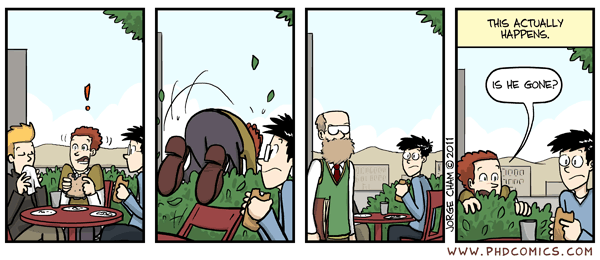Thanks to PhD Comics for the image.
As PhD students, we all undergo some form of supervision. Depending on what year you're in, how well your studies are going, what day of the week it is and innumerable other factors, supervision can be a good or a bad thing.
At the moment, for me, it's a good thing. I'm not hiding in any bushes anyway. I think a lot depends though on the structure of your supervision. At Dundee we have two (or sometimes more) supervisors. You have your primary supervisor concerned with all things research related and a second supervisor who takes more of a pastoral role. They are, as my second supervisor likes to say, your 'Academic Parents'.
There's strategic reasons on the University's before for structuring supervision in this way. If a student is having problems at home, at work, at uni or with their primary supervisor, there is another door for them to knock on. For me, it works out because my second supervisor is someone I've known throughout my undergraduate degree and who I get on well with. He is the type of person I'd go see for a chat anyway, so he seemed the perfect choice.
Supervision is essentially a constantly evolving relationship. My needs and theirs change on a weekly (if not daily) basis and it's nice to have people you can touch base with. I'm sure there will probably be times when going to my supervisor is going to be the last thing I'll want to do, but having the supervision in place at least means if I start to run off the tracks, there's a big support net there to make sure I get back on them. More than that, they have encouraged me to come along to conferences, have different ideas of things that might be useful to me and have different interests, which enriches my PhD beyond just the research. I suppose some might call in networking, but my supervisors are people I do hope to count as friends by the time I leave.
It's a tricky thing, supervision, and I imagine you might be reading this thinking I am either naive or demented - which is possible! - but for now, it's working in my favour.
As PhD students, we all undergo some form of supervision. Depending on what year you're in, how well your studies are going, what day of the week it is and innumerable other factors, supervision can be a good or a bad thing.
At the moment, for me, it's a good thing. I'm not hiding in any bushes anyway. I think a lot depends though on the structure of your supervision. At Dundee we have two (or sometimes more) supervisors. You have your primary supervisor concerned with all things research related and a second supervisor who takes more of a pastoral role. They are, as my second supervisor likes to say, your 'Academic Parents'.
There's strategic reasons on the University's before for structuring supervision in this way. If a student is having problems at home, at work, at uni or with their primary supervisor, there is another door for them to knock on. For me, it works out because my second supervisor is someone I've known throughout my undergraduate degree and who I get on well with. He is the type of person I'd go see for a chat anyway, so he seemed the perfect choice.
Supervision is essentially a constantly evolving relationship. My needs and theirs change on a weekly (if not daily) basis and it's nice to have people you can touch base with. I'm sure there will probably be times when going to my supervisor is going to be the last thing I'll want to do, but having the supervision in place at least means if I start to run off the tracks, there's a big support net there to make sure I get back on them. More than that, they have encouraged me to come along to conferences, have different ideas of things that might be useful to me and have different interests, which enriches my PhD beyond just the research. I suppose some might call in networking, but my supervisors are people I do hope to count as friends by the time I leave.
It's a tricky thing, supervision, and I imagine you might be reading this thinking I am either naive or demented - which is possible! - but for now, it's working in my favour.

No comments:
Post a Comment